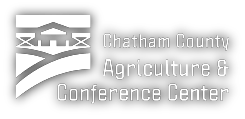Our mission is to provide you with an excellent experience, whether it is a productive meeting or enjoyable special occasion. We are committed to providing value and service. We lead through affordability, safety, efficiency, and performance. Our standards are high and we will strive to exceed your expectations.
The Chatham County Agriculture & Conference Center (CCACC) Code of Ethics (Code) is designed to confirm our compliance with laws and ethical standards. This Code is applicable to all conference center staff members.
Employees
Employees are expected to assume personal responsibility for performing their duties with fairness and integrity and agree to work to the best of their abilities, while making decisions consistent with the Code. If a staff member becomes aware of a possible violation of the Code, he is expected to: act promptly and in good faith by raising it with his supervisor and be prepared to cooperate in investigations regarding violations of the Code.
Management
The responsibilities of managers include and go beyond those of other employees. As a manager, you are expected to: know the Code in detail and actively promote it in the workplace; lead by providing a model of high standards of ethical conduct, creating a work environment reflecting the content and the spirit of the Code; be vigilant in preventing, detecting, and responding to any violations of the Code; and protect those who report violations.
POLICY STATEMENT
1. Standards of Conduct/Compliance with Applicable Laws
It is our policy to conduct business in accordance with all applicable laws and regulations and to do so with honesty and integrity and in accordance with the highest moral and ethical standards.
2. Conflicts of Interest
A conflict of interest can occur when the private interest of a person who is covered by this Code interferes, or reasonably appears to interfere, with the interests of Chatham County. You should avoid any private interest that influences your ability to act in the interests of the county, the conference center, or that makes it difficult to perform your work objectively and effectively. Conflicts of interest may also arise if you (or any member of your family) receive personal benefits as a result of your position.
Situations involving a conflict of interest may not always be obvious or easy to resolve. If you suspect that you have a conflict of interest, or something that others could reasonably perceive as a conflict of interest, you should report it to your supervisor. Your supervisor will work with you to determine whether you have a conflict of interest and, if so, how best to address it.
3. Personal Business Opportunities
You are expected to advance the interests of Chatham County/CCACC when the opportunity to do so arises. You may not take for yourself business opportunities that arise through either the use of our facility or information or your position. You are also prohibited from using either our facility or information or your position for personal gain.
4. Confidential Information
You have occasional access to confidential information while employed at Chatham County, as applicable. Examples of such confidential information include, without limitation, marketing strategies and financial information. Respect the property of clients, including its intellectual property (such as trademarks, logos, brand names and computer systems) and confidential information. You are expected to safeguard all confidential information of Chatham County or third parties with we conduct business, except when disclosure is authorized or legally mandated.
5. Protection and Proper Use of Corporate Assets
You should protect the assets of Chatham County, as applicable, and ensure their efficient use for legitimate business purposes only. No funds, assets, services or facilities of Chatham County may be used, directly or indirectly, for any unlawful or unethical purpose. Use the property only for legitimate business purposes, as authorized in connection with your job responsibilities. You should not share or use computer access information, such as passwords.
6. Prohibition Against Bribes or Kickbacks
You are prohibited from using or promising to use the funds, assets, services or facilities of Chatham County to secure or retain business where such use is in violation of any applicable law or regulation. Without limiting the foregoing, you are prohibited from engaging in any form of bribery or kickbacks and from using the funds, assets, services or facility to improperly influence or corrupt the action of any government official, agent or employee or of any private customer, supplier or other person. In addition, employees may be held liable for bribery or kickbacks by third parties working on behalf of the company (such as consultants, suppliers, distributors, and other intermediaries) where employees knew or reasonably should have known of the third party’s unlawful action, given the circumstances.
7. Gifts and Entertainment
Gifts and entertainment should not compromise, or appear to compromise, your ability to make objective and fair business decisions. Gifts from customers or suppliers should not be viewed as an inducement to or reward for any particular business decision. Human Resource Director can provide guidance on definition of a gift and acceptance of reasonable gift offerings (food).
8. Prohibition Against Taking Commissions or Referral Fees
You are prohibited from accepting anything of value in exchange for referring third parties to any person, organization or group doing business or seeking to do business with Chatham County.
9. Certification
After reading this Code, all employees working at CCACC shall acknowledge in writing that they have read and understood this Code of Ethics, and understand that they are responsible to abide fully with all of the obligations contained herein. The Acknowledgement of Code of Ethics form attached at the end of this Code may be executed via an electronic acknowledgement or by returning a signed copy of the Acknowledgement to County Manager.




